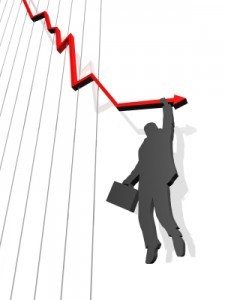

 The biggest economic debate is between Keynesians (who want more government spending and lower interest rates in order to fuel demand) and supply-side “austerics” (who want lower taxes on the wealthy and on corporations to boost incentives to hire and invest, and who see government deficits crowding out private investment).
The biggest economic debate is between Keynesians (who want more government spending and lower interest rates in order to fuel demand) and supply-side “austerics” (who want lower taxes on the wealthy and on corporations to boost incentives to hire and invest, and who see government deficits crowding out private investment).
But both approaches have problems.
George W. Bush tried supply-side tax cuts but nothing trickled down. Jobs and wages declined. And austerity economics has been a disaster for Europe.
Unfortunately the U.S. is now adopting supply-side austerics by making the Bush tax cuts permanent for 98 percent of taxpayers, hiking Social Security taxes back up, and implementing the sequester.
I’m on the Keynesian side. Yet the biggest weakness of modern Keynesian economics is it doesn’t have a clear answer for how much spending is necessary in an economy, like ours, in which wages keep dropping and government debt keeps growing.
» Read more about: America’s Worst Recovery on Record — And Why »
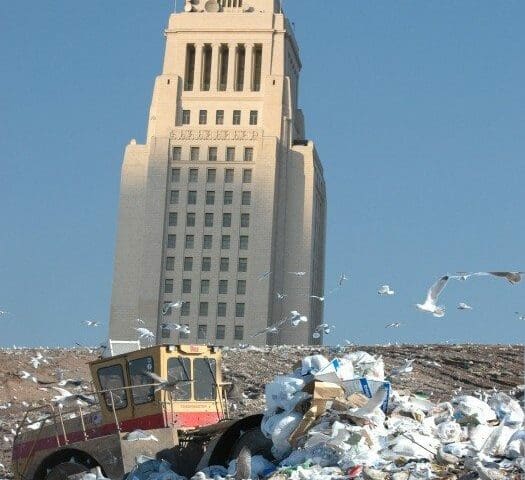
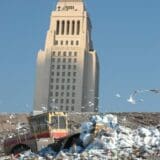
There’s a growing impatience amongst those committed to pushing L.A. to meet its ambitious Zero Waste goals. For years, the Don’t Waste LA Coalition, which includes Sierra Club, Coalition for Clean Air, Sustain L.A. and the Natural Resources Defense Council (NRDC), has been pushing to address the large portion of trash that goes to landfills from businesses and large apartment buildings. Addressing this sector will be a game changer for L.A. And after an arduous process with a multitude of hearings, workshops, and meetings, we’re ready to move forward.
Right now, the open permit system that handles waste from businesses and large apartment buildings has failed us. Its bottom barrel competition has left us with a measly 19 percent diversion rate for businesses in L.A. And, despite the best effort from business lobbyists to defend this type of program, we’ve seen a lack of effort to live up to the environmental stewardship demanded in a city like Los Angeles.
» Read more about: L.A.’s Slow Push to Meet Its Zero Waste Target »
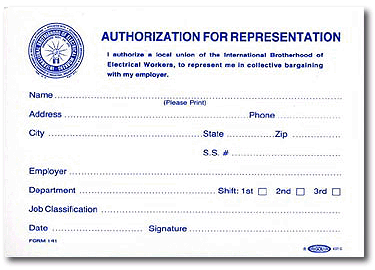

 My cousin and I have stayed in touch over the years despite the distance — he grew up in a Texas border town and has lived his adult life in Phoenix. Both he and his wife have held well-paid positions in the health field. Like most families, when we visit, we avoid subjects in-laws shouldn’t talk about, including politics and religion. But this time, he brought up the topic of unions, so over the next several days we talked intermittently about unions and why low wage workers need them.
My cousin and I have stayed in touch over the years despite the distance — he grew up in a Texas border town and has lived his adult life in Phoenix. Both he and his wife have held well-paid positions in the health field. Like most families, when we visit, we avoid subjects in-laws shouldn’t talk about, including politics and religion. But this time, he brought up the topic of unions, so over the next several days we talked intermittently about unions and why low wage workers need them.
On our final evening together, we sat across from each other in one of those expensive Santa Monica restaurants named after its chef. I said, “So here is the bottom line for me: People who work all day should be able to provide shelter and food for their families, and they ought to have health care.”
“I don’t know that I disagree with that,” he replied.
» Read more about: Building a Better Life: Bottom Lines and Top Priorities »


 College student leaders from across California reacted to the President’s budget on April 10, calling on Congress to extend the low interest rate and give students time to weigh in on more comprehensive reform. Last year, Congress temporarily extended the low rate for one year, which saved close to eight million students $1,000 per loan borrowed. California Public Interest Research Group (CALPIRG) leaders, working in coalition with many student advocacy groups and education groups led the charge to make sure that Congress didn’t double our rates last year, with the deadline looming once again, we are calling on these same decision makers to step up again this year.
College student leaders from across California reacted to the President’s budget on April 10, calling on Congress to extend the low interest rate and give students time to weigh in on more comprehensive reform. Last year, Congress temporarily extended the low rate for one year, which saved close to eight million students $1,000 per loan borrowed. California Public Interest Research Group (CALPIRG) leaders, working in coalition with many student advocacy groups and education groups led the charge to make sure that Congress didn’t double our rates last year, with the deadline looming once again, we are calling on these same decision makers to step up again this year.
The President released a budget that included a proposal for preventing the student loan interest rate from doubling this July 1.
“Unfortunately, the President’s proposal lowers interest rates now by charging more from student borrowers down the road,” said Roshni Ashok,
» Read more about: White House Budget Leaves Students in the Lurch »
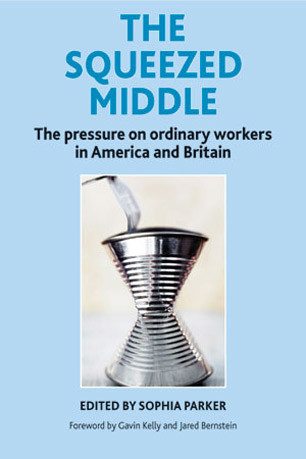
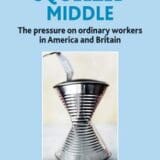
 The Squeezed Middle: The Pressure on Ordinary Workers in America and Britain, a short book edited by Sophia Parker, brings together 16 scholars and activists to diagnose America’s malaise. (Policy Press, 2013.)
The Squeezed Middle: The Pressure on Ordinary Workers in America and Britain, a short book edited by Sophia Parker, brings together 16 scholars and activists to diagnose America’s malaise. (Policy Press, 2013.)
You probably don’t need a book to tell you that the United States has fallen into the economic abyss and the United Kingdom is teetering on the edge. Wages have been flat for 40 years; welfare as we knew it is gone and the political system has been corrupted by corporations and greed.
If you’re British, you might think that the United Kingdom isn’t teetering, but has already firmly landed at rock bottom. If that’s what you think, then think again. Things are much more savage on the Tea Party side of the Atlantic Ocean. Mother country, beware.
Inequality has risen dramatically in both the United States and the United Kingdom,
Here’s Public Works‘ singalong video of Irving Berlin’s 1942 song, “I Paid My Taxes Today,” performed by Gene Autry. Lyrics below:
I said to my Uncle Sam
“Old Man Taxes, here I am”
And he was glad to see me.
Mister Small Fry, yes, indeed.
Lower brackets, that’s my speed.
But he was glad to see me.
I paid my income tax today.
I never felt so proud before,
To be right there with the millions more
Who paid their income tax today.
I’m squared up with the USA
See those bombers in the sky,
Rockefeller helped to build ‘em.
So did I.
I PAID MY INCOME TAX TODAY
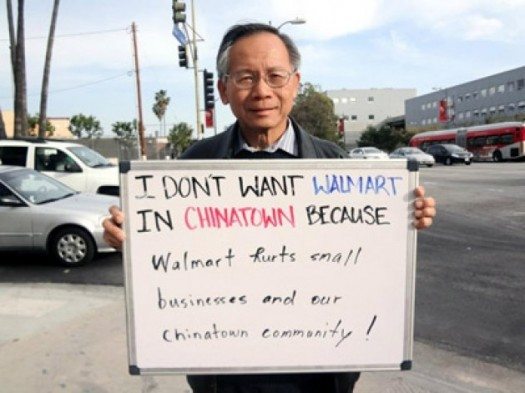
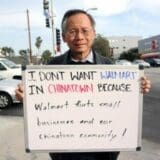
Walmart might have viewed their plans to open in an existing building in Los Angeles Chinatown as a bullet-proof strategy. The retail giant would open its new store in the Grand Plaza, an existing building, that unlike new construction, would allow the retailer to proceed without a public hearing.
As the company worked on its renovation plans, which started last year, Aiha Nguyen at the Los Angeles Alliance for a New Economy (LAANE) and community members dug through reams of city documents.
They realized the retailer and city officials needed something central to the democratic process — a public hearing for neighborhood residents to provide feedback about the store in the Grand Plaza building.
The Grand Plaza had received about $7 million in subsidies years ago, Nguyen said, adding that a hearing and environmental requirements from a city-approved Chinatown Redevelopment Plan still apply to any new tenant.
That requirement is serving as the basis for the April 4 lawsuit that could block Walmart from opening in 30,000 square feet of space in the downtown area.
» Read more about: Community Fights Walmart’s Backdoor Chinatown Strategy »
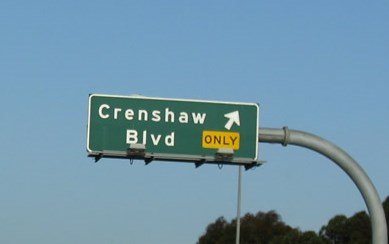
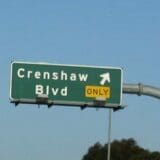
 (As the May 21 mayoral runoff election approaches, Frying Pan News is asking voters what they believe the next mayor’s priorities should be — as well as what he or she should avoid doing once in office. This week reporter Marc Haefele interviews South Los Angeles residents at the Baldwin Hills Crenshaw Plaza, the sprawling retail complex located at Martin Luther King Jr. and Crenshaw boulevards.)
(As the May 21 mayoral runoff election approaches, Frying Pan News is asking voters what they believe the next mayor’s priorities should be — as well as what he or she should avoid doing once in office. This week reporter Marc Haefele interviews South Los Angeles residents at the Baldwin Hills Crenshaw Plaza, the sprawling retail complex located at Martin Luther King Jr. and Crenshaw boulevards.)
Carmen Navarro:
I would hope the new mayor would at least do better than the current one. Of course, they are all politicians aren’t they — what can you expect? Sometimes the most you can do is to hope that it just doesn’t get worse when someone new is elected.
But here’s what I hope the new mayor would do — do a lot more to help the poor folks. Help them to get more opportunities. The economy right now is still simply horrible for poor folks.
» Read more about: L.A. Mayor’s Race: The View from Crenshaw »
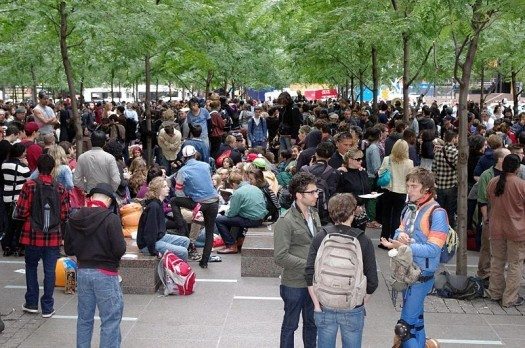
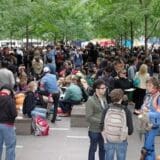
Was Occupy Wall Street just a dream? The fall of 2011 was one of the most exciting and optimistic times of my life as a progressive. Seeing thousands of young people all over the country flock to their local occupations was truly amazing and historic. I felt that we were in the middle of a cultural awakening and that a huge radical change was just on the brink.
The other weekend I went to New York City to see where it all began up close and in person. I walked to Wall Street to find Zuccotti Park and literally walked right past it. Quite naively I expected a huge space with progressive activists still meeting and planning the revolution, but found no one. In fact, Zuccotti Park is a tiny little plaza where tourists rest after visiting Ground Zero and taking pictures of the Wall Street bull sculpture. On the subway back to my friend’s house,
» Read more about: Zuccotti Park Blues: Occupy Wall Street Reconsidered »
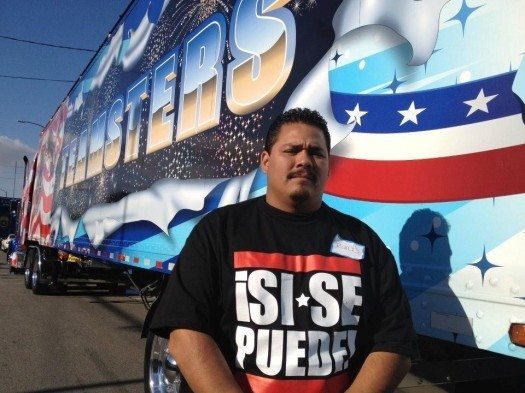

(Orlando Ayala has been a truck driver at the ports of L.A. and Long Beach for 10 years. He recently sat down and talked to LAANE Deputy Director Patricia Castellanos about the successful effort to improve conditions at Toll, the global logistics company where he works. Yesterday marked the one-year anniversary of the election in which Toll workers chose to be represented by a union – the first such election in three decades.)
I was recently accused of thinking with my heart and not with my head, of letting my passions and outrage get the best of me and guide my actions. At the time, this wasn’t a compliment. But these traits have served me well. If not for them, I may not have crossed multiple borders seeking a better life in the U.S., or been driven to action by the outrage I felt at seeing injustices suffered by the thousands of port truck drivers at the largest port in the country.
» Read more about: How Organizing for a Union Changed My Life »